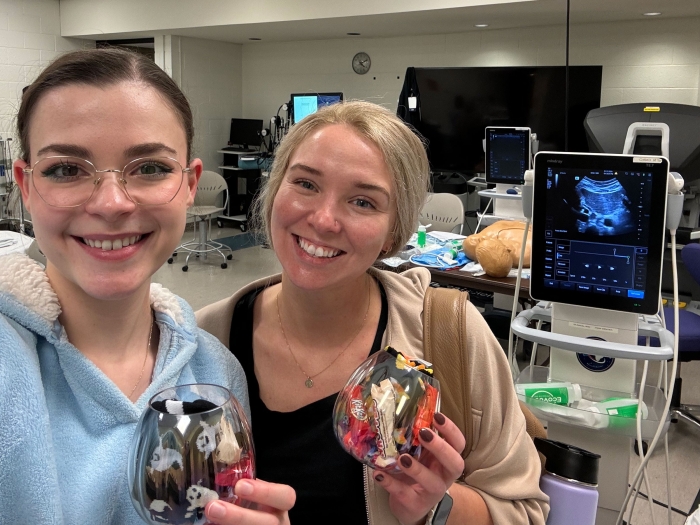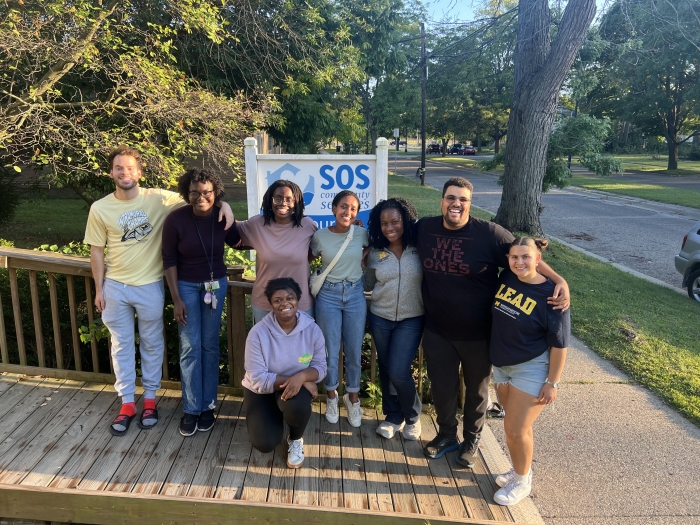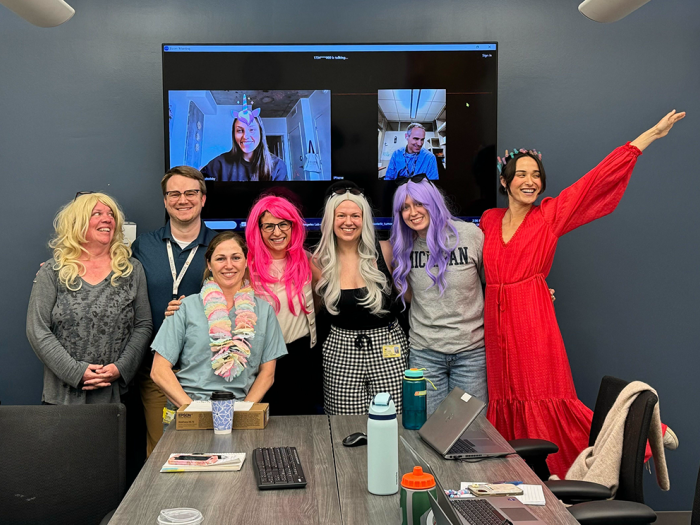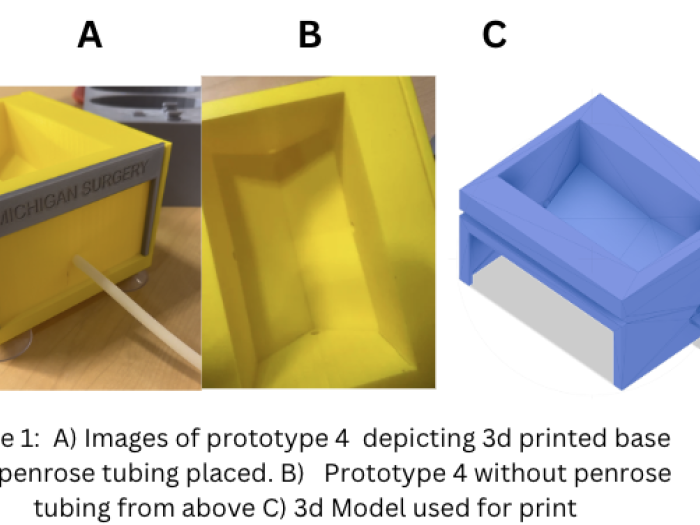
M3 Alicia Jacobson (she/her, pictured second from left) grew up in Newton, MA, and graduated from University of Maryland in 2014. She spent the intervening years focused on outdoor education in Nepal, Australia and New England, which illuminated a passion for reducing barriers to health care and improving quality of life.
Here, she shares more about why she chose Michigan, what she likes to do in her spare time, her research project on bone health, gender-affirming hormone therapy and orthopaedics (her chosen specialty), and how she has grown through her many mentors at Michigan.
What called you to explore a career in medicine?
I followed a rather circuitous path to medicine. After graduating from college, I took the advice of a trusted mentor and explored my passion for outdoor education. That wisdom led me to hike over 17,500 feet in Nepal, lead wilderness expeditions in Australia and eventually build an outdoor leadership development program in New England. After returning to Boston to be closer to family, I became fascinated with how the barriers to healthcare - whether geographic, such as those experienced on expedition, or socioeconomic, seen up close in my new role as a community health worker - were more similar than previously thought. I knew that I wanted a career that could tangibly improve someone’s quality of life by focusing on barriers to high quality medical care and decided (eventually) to do that through medicine.
Why did you decide to attend Michigan?
The UMMS community provides a unique marriage between passionate students and supportive, trusted mentors who together can accomplish remarkable change. After spending numerous years developing my own interests outside of the classroom, I was eager to take action on my passions. Whether through student organization leadership, independent research projects or near-peer mentorship, Michigan provides the resources and support for students to create change. Additionally, UMMS offered a strong community of non-traditional students and families. Providing academic support for a student is one thing, providing a supportive community for that student’s family is another. My wife and I feel very grateful for our time in Ann Arbor, and the community that blooms here.
How have your experiences at Michigan led you to choose your specialty for residency?
Mirroring my path to medicine, my process of choosing a specialty felt equally unexpected. Until medical school, I felt intimidated by a surgical career. But throughout my clinical rotations, I began to realize how many similarities exist between surgeons and expedition leaders.
A great expedition leader need not only have exceptional technical skills related to rock climbing or backpacking - but also the communication, leadership and risk management prowess to navigate large teams in high-stress environments. This concept applies directly to the OR. I love being part of a team similarly reliant upon leadership skills and technical skills, all in service of a single goal - improving the quality of a patient’s life.
After realizing that I wanted to spend my career in the OR, I attended a “Women’s in Ortho” night comprised of speakers and hands-on learning opportunities that left me with a clear and unwavering sense of joy - I had never had so much fun during medical school. I am excited to pursue a career dedicated to preserving and/or restoring quality of life while simultaneously building upon my skills honed in the Australian outback.
What types of research have you become involved in at Michigan?
With prior research experience, I wanted to build my capacity as a clinician-scientist by leading projects from idea to publication. This intention, however, is only achievable with immense support from accomplished yet accessible, supportive faculty. I am lucky to work closely with Dr. Jaimo Ahn and the Orthopaedic Trauma team here at UMMS exploring fracture outcomes (incidence and fracture type) for transgender and gender diverse patients across the US.
After moving to Ann Arbor, my wife and I built a community through numerous outlets, one of which included a recreational soccer league. One of our closest friends, undergoing gender affirming medical care at the time, was newly struggling with how his gender identity might alter his life-long passion for soccer. His process aligned with my developing interest in orthopedic surgery, which prompted me to investigate the interaction between bone health, gender-affirming hormone therapy and orthopedics. This current project grew out of a “cold email” sent to Dr. Ahn, who eagerly joined this inquiry.
We now work with a team of LGBTQIA+ researchers across six institutions in collaboration with PrideOrtho, the national LGBTQIA+ in Orthopaedics organization. In my research year, I will be directing this multi-center project evaluating patient experiences, priorities for future research and gaps in provider education on LGBTQIA+ patients. This project has been one of the highlights of my medical journey thus far, and I feel indebted to my mentors for such valuable guidance and support along the way.
What significant extracurricular activities have been a part of your medical education so far and how have they enriched your medical school experience?
I had wondered how my prior work history in outdoor education might align with future medical training. During my first year, I joined the executive board of Creating Adventurous and Mindful Physicians (CAMP) as the Training Director and worked with a highly skilled team of fellow students to develop a first-ever five-day wilderness expedition orientation trip for incoming medical students. In a world intimately connected by technology, the opportunity to put devices away, form meaningful peer connections while working through challenges together as a team is sometimes rare, but always foundational. I am excited to continue this work as we build similar orientation programming for incoming residents at Michigan Medicine.
What has been your strategy for finding balance between med school and your other interests?
As an incoming student with a spouse, I (and my wife) had concerns about how to create enough time for our relationship alongside the demands of medical school. Time is a valuable resource. In order to ensure we had enough time together each week, we made a plan to share at least one meal together each day, one date night each week and one spontaneous activity each month. While there were weeks that didn’t align perfectly with this overall plan, the sense of structure allowed me to schedule in our relationship just like I scheduled in other school-related activities. This is not a perfect system, and there were certainly days when we didn’t hit our goals - but the overall effect was a demonstration that our relationship and my personal life was just as much of a priority as my studies.
What do you like to do in your free time?
My free time almost uniformly revolves around physical activity and being outside. Whether lifting weights, doing yoga or hiking at Pinckney Recreational Area, movement is an essential part of my every day and it’s even better when I get to share this with friends, my wife and my dog.
Recently, we have been taking our standup paddle boards to Gallup Park to paddle, float and swim. Having outdoor access at our fingertips is such an advantage of the Ann Arbor area!
How have you been able to connect with faculty mentors and/or peer mentors and how has that been important to your med school journey?
Faculty mentors abound at Michigan. Students commonly discuss how, in fact, it can feel like there are almost too many mentors. During M1 year, every student is paired with a Doctoring coach and assessor. I was lucky enough to work with Dr. Cathy Kim and Dr. Doug Gelb as my doctoring faculty.
Dr. Kim and Dr. Gelb became some of my strongest mentors, from helping to navigate a challenging curriculum to which specialty suited me best. As I moved into the Branches, Dr. Sam Kempner, my Branch advisor, has become a lifeline for guidance, laughter and self-reflection.
Finally, Dr. Jaimo Ahn and Dr. Liz Dailey are essential pieces of my growth as a learner within Orthopedics. Part of the joy of being a student at Michigan, is the realization that mentors may enter your academic life at different time points, but you maintain and accrue the combined wisdom throughout your four years - and beyond!

Clinical Assistant Professor

Clinical Professor

Clinical Assistant Professor

Associate Professor





